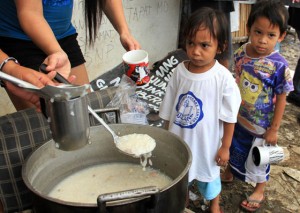Peasant and fisherfolk protested on World Food Day on Friday, calling for genuine agrarian reform, which, they said, will solve hunger.
They protested in front of the Department of Agriculture’s office in Quezon City holding placards bearing calls such as “Pagkain hindi bala! Lupa sa nagbubungkal! (Food not bullets! Land to the tiller!) A farmer carried an empty pot, to depict hunger in the countryside, where the producers are.
“It is ironic that the rural people who are the primary food producers are the ones who are experiencing lack of food and drastic hunger,” said Salvador France, Pamalakaya vice chairman. “This has been a running nightmare especially for the fisherfolk and farmers all over the country.”
France said that based on data from the Philippine Statistics Authority (PSA), these are the top two sectors with the highest poverty incidence.
Peasant groups called for the enactment of the Genuine Agrarian Reform bill (Garb), and a stop to the smuggling of imported rice.
Ronald Garcia, an agricultural engineer and member of Advocates of Science and Technology for the People (Agham) said the 2015 theme for World Food Day — “Social Protection and agriculture: breaking the cycle of rural poverty” — is in sharp contrast with the situation of Philippine agriculture.
Garcia criticized the 2011-2016 Food Staples Self-sufficiency Roadmap (FSSR) program of the Aquino government which targeted 100 percent rice self-sufficiency.
However, he said the Philippines remains one of the top net importer of rice in the world, importing 1.6 million metric tons of rice in 2014. This year’s rice imports is projected to increase further.
Free irrigation bill
Anakpawis Rep. Fernando Hicap, meanwhile, pushed for free irrigation services for farmers through House Bill 6224, or the Free Irrigation Services Bill.
Irrigation is one of the primary factors for the growth of agricultural productivity, Hicap said, and food security is impossible without free irrigation service in the country.
“The agriculture sector is the backbone of the national economy as the country remains agricultural, where farmers and farm workers, who comprise the vast majority of the population, till the lands for their livelihood and for the benefit of the entire nation,” Hicap said.
The National Irrigation Administration (NIA) reported that as of 2014, only 57 percent of the targeted 3 million hectares had irrigation, with 1.3 million hectares still without irrigation.
Hicap said the huge budget of the National Irrigation Administration does not benefit farmers. The NIA even charges for the irrigation. The proposed NIA budget was increased from P28 billion ($622 million) in 2015 to the proposed P33 billion ($709 million) for 2016.
Hicap said irrigation fees add to the cost of rice production, with farmers bearing the high cost of fuel for water pumps. Many just depend on the rain, and eventually, “go bankrupt and lose their lands.”
Hicap called for a stop to the collection of irrigation fees, as proposed by HB 6224. He said the budget for construction, repair and maintenance of national irrigation systems should be included in the General Appropriations Act.
“To move on the path towards food security and rice self-sufficiency, we challenge President Aquino’s government to immediately pass this bill and take control of the dams to irrigate the farms across the country,” Hicap said.
Water as priced commodity
Agham’s Garcia said the “Philippines is the only country in Asia where farmers pay for irrigation services, in line with World Bank policy to treat water resources as a priced commodity.
He said the government has continued to neglect its obligation to provide agricultural inputs and utilities to help farmers in the face of calamities, such as the El Niño phenomenon.
In Basey, Samar, where Agham recently conducted an agriculture productivity assessment, irrigation facilities built during the Ramos regime remained unused, and farms still rely on rain, Garcia said.
He said that in the face of heavy losses suffered by farmers due to El Niño, the government has turned to rice importation to feed the country.


